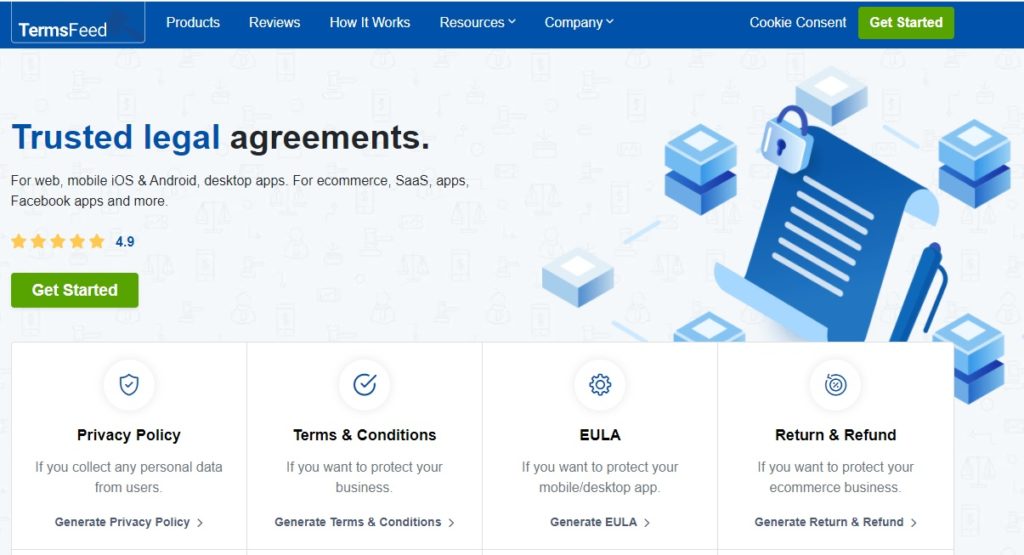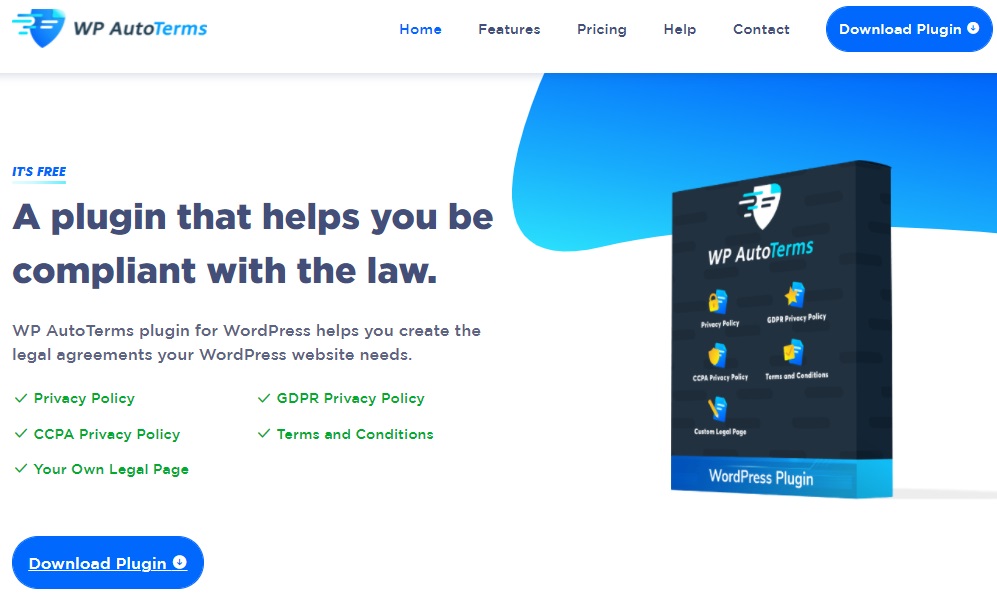Privacy policies are designed to help website visitors understand how their privacy is protected. They also provide information about the website’s data practices, including the privacy of collected personal data and what happens with that data when it is shared with third parties.

Privacy policies can be difficult for small businesses or people who don’t have a legal background to write themselves, so here are ten free privacy policy generators you can use in 2021!
Your Privacy Policy is a Fundamental Part of Your Website Design
You may hire a professional design company, or you may take a DIY approach to build your website from the ground up, but as a fundamental part of its design, your website needs to have a clear and concise privacy policy easily accessible to viewers.
In many situations, the privacy policy is a legal requirement rather than an option. There are global laws, federal laws, and state laws pertaining to privacy policies. COPPA, The Children’s Online Privacy Protection Act in the U.S., requires all websites that collect data from minors to have a privacy policy. But that’s not all. If you intend on using third-party providers such as Google Ads, or Google Analytics, those providers may also have requirements in place for a mandatory privacy policy on your website.

Some companies choose to simply add their privacy policy to the footer of every page on their website – where it’s easily accessible but also less noticeable. This is suitable if you have a very simple privacy policy without many elements or clauses behind your terms for collecting data from users online. For example, “this site collects some personal information via cookies.” However, this approach can make it harder for concerned customers to find the privacy policy after becoming suspicious about how user data is being handled by your website.
Your web developer doesn’t know your policies and won’t create that document for you (unless that’s a separate service they provide). Instead, you’ll have to generate your website’s privacy policy on your own, either by writing it yourself (watch out for legalities!) or by using a website privacy policy generator.
Keep in mind that privacy policies are often legal documents rather than marketing tools, so they’re best when written for a more formal and professional tone.
What is a Privacy Policy, and Why Does It Matter?
A privacy policy on your website is a legal document that details your business’s privacy practices. This includes policies for customer data, such as what information can be collected from users and how it will be used. It also outlines third parties that are involved in collecting or processing personal data on your site, including analytics services or advertisers who interact with visitors through ad retargeting pixels.
Privacy policies are necessary because they help website owners communicate their privacy best practices to customers, so they feel safe visiting sites and sharing their own details online.
Privacy policies are often long and complex documents if they’re written by lawyers or web teams with knowledge of website privacy practices. When smaller companies don’t have their own legal team, these laws can be confusing and difficult to navigate when writing privacy policies directly from scratch.
That’s where free online privacy policy generators come in handy! These tools will help you create accurate privacy statements without any prior knowledge required.
What Should be Included in a Privacy Policy?
As privacy policies can vary greatly depending on who is creating them and their purpose, there’s no one-size-fits-all rule for what should be included.
However, even if you’re writing your own privacy policy from scratch – or using the free online privacy generator tools listed below – it’s important to make sure the document has key components such as:
- Your website’s physical location data collection practices (i.e., how user information is collected by cookies)
- The legal bases for collecting personal information through your site (for example, whether users must provide consent before handing over any private details)

- What third parties are involved with handling data on your website
- How long customer data will be stored
- Who that data may be shared with – and under what circumstances
- Any third-party privacy policies your site is subject to, such as those from Google or other advertising service providers
- How privacy policies are updated (i.e., how frequently privacy practices will change and when users may be notified of changes)
- Links to additional privacy resources for concerned customers, such as the ICO’s website privacy guidance in the U.K. or Canada’s privacy laws on government websites.
How to Write Your Company’s Privacy Policy
A free online privacy policy generator can help – but remember that these tools are not legal advice or an end-all solution for creating privacy statements on websites.
You may feel inspired to write your website’s privacy policy by yourself, so you know exactly what’s in it. If so, familiarize yourself with privacy policies and terms of service, so you know what best practices look like – this will make it easier to write up your own privacy policy later.
You should be aware of any laws related to collecting user data before writing your website’s privacy policy. For example, if users must provide consent before personal information is collected from their site visit, you’ll need a checkbox where they agree to share details before filling out other fields in the form. Make sure privacy policies are geographically relevant to your website services.
Include privacy policies for third parties involved with your websites, such as advertising networks and analytics services.
Be transparent about who has access to user data on your site – whether it’s you or a third party that will be handling information collected from visitors to the site. For example, if advertisers are responsible for handling customer details that must be shared to purchase ad space, make sure this is clearly spelled out in the privacy policy, so customers know precisely what they’re signing up for when visiting sites.
Lastly, but most importantly: Be clear about how long personal information is stored by your website. This may vary depending on different factors like legal requirements or industry standards of practice (for instance, medical providers might need patient records indefinitely). The privacy policy generator tools below can help you with this.
Don’t forget privacy policy generators offer more than just boilerplates – they can also be used as a starting point for developing privacy statements that accurately reflect how you collect, store, and share user data on your site.
What is a Privacy Policy Generator?
A privacy policy generator is an online resource that allows website owners to fill out information about their privacy practices so a privacy policy document can be automatically generated. The templates can be free to use and don’t require any technical expertise.

Rather than hiring a lawyer, privacy generator tools allow website owners to put together their own legal documents that meet industry standards of practice. Privacy policy generators are not legal advice; however – they are tools that help website owners draft privacy statements for their sites.
Ten Free Website Privacy Policy Generators
Privacy policy generators can help with almost all these language requirements by providing a pre-written privacy statement and customizable privacy policy text that generates legal privacy statements you can use free online without any prior knowledge required.
Here are ten privacy policy generators that can be used to create free privacy policies for your website.
One: FreePrivacyPolicy.com
(https://www.freeprivacypolicy.com)
FreePrivacyPolicy is a privacy policy generator that can be used to create privacy policies for free. The website is easy to use, and clients only need to enter their information in one field, select the location of their business (or home), and generate a privacy policy which they are then able to download.
Two: TermsFeed.com
TermsFeed.com is a privacy policy generator that also creates privacy policies for free. There is a privacy policy template that must be selected, and users will enter information in the relevant fields, such as contact details, website URL, company name, etc., to generate their privacy policy document. This privacy statement can then be downloaded from the site along with any changes made by clicking on ‘save.’

Three: Shopify.com
(https://www.shopify.com/tools/policy-generator?prev_msid=0a78ac69-F16B-4877-A3EC-AF2DEDC48EF9)
Shopify.com’s privacy policy generator is a free tool that can be used to create privacy policies. The site requires users to add their website URL and company email; then, they will have the option of entering a privacy policy title and selecting from four different privacy statement templates before generating an editable document that must be saved in order for changes to be made on it.
Four: LegalDocsOnline
(https://legaldocs.co.in/privacy-policy-generator)
LegalDocsOnline is a free legal forms generator with a privacy policy template available at no extra cost. Users enter information such as name, business type, or home office address into pre-defined fields within the form while allowing them to choose between short-form and long-form privacy statements. Once completed, this privacy statement is automatically generated without any further action required by the user before downloading.
Five: Termly
(https://termly.io/products/privacy-policy-generator/)
Termly is a privacy policy generator available for free that can be used to create privacy policies. Users are able to download privacy policy templates in Word format, start with a blank privacy statement or edit the pre-generated document once it is generated by Termly’s privacy tool.
Six: Privacy Policy Generator
(https://www.privacypolicygenerator.info)
Privacy Policy Generator is a privacy policy generator available for free online without the need to create an account or signing up before using it. Users are able to select one of nine privacy statements templates from this site before generating their editable privacy policies and downloading these documents for quick editing in Google Docs with just two clicks per document generated!
Seven: WP AutoTerms
WP AutoTerms privacy policy generator is a free privacy statement generator that can be used to create privacy policies for your WordPress website. The privacy policy template available through this plugin applies to WordPress websites, and users must download it before editing using the privacy tool on WP AutoTerms’ site.

Eight: The Firebase App
(https://app-privacy-policy-generator.firebaseapp.com)
The Firebase privacy policy generator is a free tool that can be used to create privacy policies. Users must select from one of the five privacy statement templates available before entering their website URL and company name or email address, which will generate an editable privacy policy document immediately without any further action required.
Nine: Shift4Shop.com
(https://www.shift4shop.com/personalized-policy.html)
NineShift4Shop.com offers a free privacy policy generator to create a privacy policy for your website. The privacy policy generator works by selecting the privacy statement template that best fits your website, entering information, such as name and company email address, to generate a free privacy statement which can then be downloaded.
Ten: TermsFeed
TermsFeed privacy policy generator is a free privacy statement creator that can be used to create privacy policies for websites. Users are able to specify the website domain and select one of four pre-generated privacy statements or start with a blank document before generating an editable privacy policy, which must then be downloaded for editing in Google Docs.
Conclusion
Your website must have a privacy policy, or you could face legal implications. You could write it yourself from scratch, or you can use a free website privacy policy generator.
There are many privacy policy generators available online free of charge, which can be used to create privacy policies for your website.

Some privacy policy generators allow users to create privacy policies with pre-generated templates, while other privacy statement creators require you to select one of the available privacy statement templates before generating an editable document for quick editing in Google Docs.
There are a number of free privacy policy generators that can be used online without creating an account or signing up first, and some even offer further functionality such as letting website owners specify their website URL so they receive a customized privacy policy which must then be downloaded immediately after being generated.

